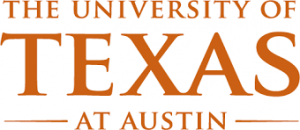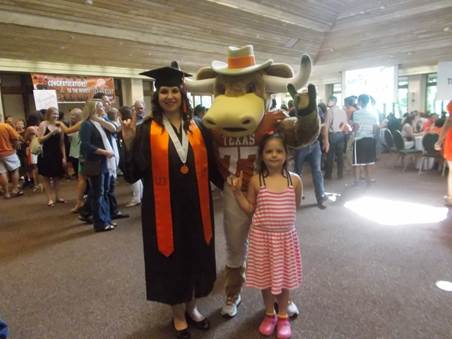UT Austin
UT McNair Scholar awarded fellowship by National Science Foundation
Posted by McNair Scholars Program on Sunday, July 12, 2015 20:44 - 0 Comments
The congratulatory National Science Foundation fellowship text messages flooded her cellphone when she was on her way to work one morning.
But when Elda Trevino checked her email, there was no award letter. Elda thought her colleagues were pulling a prank on her. She later found that an odd glitch in her Gmail account put her award email into her spam folder.
Elda Trevino jokes that her peers knew about her receiving a National Science Foundation fellowship before she did.
 Former Cockrell School of Engineering student Elda Trevino was in the Longhorn Link Program during her undergraduate career studying biomedical engineering. Her work with Dr. Laura Suggs inspired her to continue in engineering to pursue her Ph.D. Her STEM advisor, Dr. James Brown, was another mentor during her last year at UT within the McNair Scholars program.
Former Cockrell School of Engineering student Elda Trevino was in the Longhorn Link Program during her undergraduate career studying biomedical engineering. Her work with Dr. Laura Suggs inspired her to continue in engineering to pursue her Ph.D. Her STEM advisor, Dr. James Brown, was another mentor during her last year at UT within the McNair Scholars program.
“McNair Scholars has its own guidelines, but I felt Dr. Brown held us to a higher standard,” Elda says.
Elda says his encouragement inspired her to apply to more doctoral programs and fellowship opportunities. As a National Science Foundation fellow and Ford Foundation fellow, she uses the funds to pay her tuition as well as monthly stipends for living expenses.
Throughout the triumphs, Elda’s successful academic career faced its challenges. A demanding course load and raising a daughter as a single mom had its struggles during her undergraduate years. But thanks to the support from her parents she was able to graduate from the University of Texas at Austin with her degree in biomedical engineering. During the week, her daughter Lorena, stayed with her parents in Laredo and on the weekends Elda would travel to be with her. Now Lorena is seven years old and lives in Atlanta, Georgia as Elda pursues her doctoral degree. The sacrifices brought the family many benefits.
When she was a child, Elda always gravitated toward math and science but was never exposed to a professional world within the STEM field.
“I’m from a small town where people never leave the community. So growing up, I never met scientists or engineers. I didn’t know biomedical engineering –as a field existed—until I was in high school,” Elda says.
As she learned more about biomedical engineering, it became a clear choice to be her profession.
“Coming to UT opened a new world to me,” Elda says.
Elda had the opportunity to conduct undergraduate research early on in her academic career. She did three years of research with Dr. Laura Suggs within her cardiovascular tissue-engineering lab.
“I’m glad she allowed me to work in her program for three years. She was one who wrote me recommendation letters for schools and fellowships I was awarded,” Elda says.
Elda says being selected for the fellowship has been an honor. The National Science Foundation aims to select recipients who will impact the broader community with their research. She applied as an undergrad and received honorable mention. She applied the following year as a first year graduate student and won. The award pays for three years of her tuition and fees and gives her a stipend of $34,000 a year.
The next year she will be on the Ford Foundation Fellowship, which gives her a stipend of $24,000 for the year. Georgia Tech will then pay for her tuition.
Finding funds for her STEM education was a huge relief, but Elda says that Dr. Brown’s words of advice rings true for all students looking for graduate schools: You should never have to pay for a Ph.D. in STEM.
The Georgia Institute Technology and Emory University joint biomedical engineering Ph.D. program is a five to seven year program. Elda hopes to graduate by May 2019.
“There’s so much money out there for people wanting to go to grad school in STEM,” Elda says. If you work hard and show at an early stage you have a passion for research “then you should not have to pay for a Ph.D. in STEM.”
Article originally posted in University of Texas Longhorn Center of Academic Excellence
